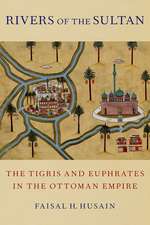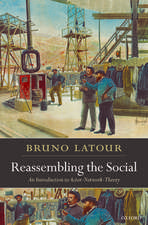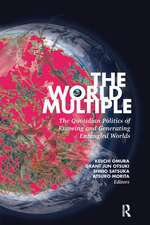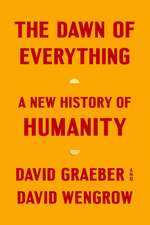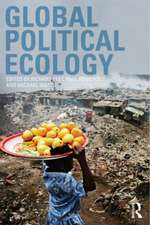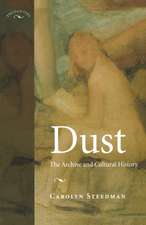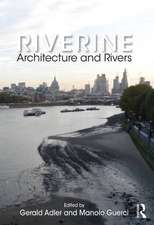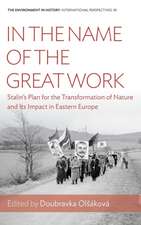West Germany and the Iron Curtain: Environment, Economy, and Culture in the Borderlands
Autor Astrid M. Eckerten Limba Engleză Hardback – 13 oct 2019
| Toate formatele și edițiile | Preț | Express |
|---|---|---|
| Paperback (1) | 186.02 lei 10-16 zile | |
| Oxford University Press – 2 aug 2021 | 186.02 lei 10-16 zile | |
| Hardback (1) | 668.67 lei 10-16 zile | |
| Oxford University Press – 13 oct 2019 | 668.67 lei 10-16 zile |
Preț: 668.67 lei
Preț vechi: 746.31 lei
-10% Nou
Puncte Express: 1003
Preț estimativ în valută:
128.08€ • 138.95$ • 106.72£
128.08€ • 138.95$ • 106.72£
Carte disponibilă
Livrare economică 02-08 noiembrie
Preluare comenzi: 021 569.72.76
Specificații
ISBN-13: 9780190690052
ISBN-10: 0190690054
Pagini: 444
Dimensiuni: 236 x 155 x 36 mm
Greutate: 0.77 kg
Editura: Oxford University Press
Colecția OUP USA
Locul publicării:New York, United States
ISBN-10: 0190690054
Pagini: 444
Dimensiuni: 236 x 155 x 36 mm
Greutate: 0.77 kg
Editura: Oxford University Press
Colecția OUP USA
Locul publicării:New York, United States
Recenzii
Eckert's book offers a fresh and inspiring look at the history of divided Germany. Rather than stopping at the Iron Curtain, it delves into discussions not only about the discursive and performative creation and consolidation of borders but also about crossborder entanglements.
Engaging and well-written....One of the greatest contributions of this book is the way it situates environmental history among the major narratives of German history Pollution knew no borders, forcing the West German government to engage in 'environmental diplomacy.'... The militarized border also had a profound impact on plant and animal life.
Eckert dispenses with the familiar tales about the making of the border and its inherent brutality. In this book, the Iron Curtain is just there, a massive barrier that created a range of regional challenges, and Eckert studies them in admirable depth.... The narrative moves beyond the threshold of 1990 and follows stories into the years after reunification. All the chapters are meticulously researched.... The borderlands were not so much a laboratory but a protected area where authorities went to great lengths to keep the promise of the miracle years alive. The result was a peculiar region that did not feel all that peculiar: it had economic stability, mass consumption and the consensual political culture of the old Federal Republic....But Germany's division is history, and so is the old Federal Republic and all the certainties that it had in store. Eckert's book is a study of a world that is irretrievably gone.
West Germany and the Iron Curtain brings a fascinating perspective to the flourishing literature on Cold War history, which has been recently concerned with dismantling Cold War myths and reimagining the Cold War period from a multifaceted perspective.
An ambitious re-examination of German history from its literal margins. Eckert's methodologically innovative analysis not only straddles the East-West divide but interrogates 1945 and 1989/90 as chronological caesuras. Refracted through the environmental history of these borderlands, Germany's political, social and cultural history looks familiar but also different in illuminating ways: Cold War border pilgrimages resemble their interwar predecessors, East Germany's devastating pollution looks less like an exception than like the rule, and the apparent successes of unification are shown to be both ambiguous and highly contingent. Written with nuance, perspicacity and subtle humour, West Germany and the Iron Curtain masterfully re-evaluates the history of twentieth-century Germany.
An imaginative and compelling local study of West Germany during the Cold War told from the perspective of the German borderlands. While the book carefully examines the economic and political implications of this fortification, it is at heart an environmental history. Eckert explores not only the contaminants that created diplomatic headaches, and, therefore, discussions between East and West, but also the ways in which the borderlands' ecosystems transformed ideas about nature and environments more broadly.
This is one of the best books I have read all year from any subfield. The author asks big questions but answers them in a way that is both focused and sophisticated. A major contribution to German history, environmental history, and the history of borders/borderlands. One of the most impressive aspects of the work is the depth and rigor of archival research. The author used sources from tiny rural archives in Germany through the records of international organizations and transnational bodies. Despite the weight of evidence, the book is sprightly, the prose is economical, and the historiographical interventions are worn lightly. Quite simply - a great book.
This study makes an important contribution to the literature, representing the first environmental history of the Iron Curtain....Eckert does not limit her investigation to the local level, instead taking a wider perspective to document the profound impact the Iron Curtain left beyond 1990. She has produced a well-conceptualized study, combining cultural, economic, and environmental methodologies to great effect....The unique framing, impeccable research, and judicious interpretations will delight historians of Germany, while the engaging writing will charm audiences beyond academia.
The notable and accessibly written monograph West Germany and the Iron Curtain is a contribution to the history of the Federal Republic that distinguishes itself from the established historiographic metanarratives.... Eckert delivers a refreshingly different perspective on certain highlights of West German history. The approach of addressing the (political) center from the periphery is implemented consistently. It's welcome that economic, political, cultural and environmental historical questions are intentionally investigated in connection with one another....The integration of developments after 1989/90...represents particular value added and offers multiple points of departure for future research.
Eckert offers a fascinating, thoroughly source-based account....[This book] provide[s] ample evidence of the changing scientific and public knowledge, meaning and images of nuclear science and technology in the twentieth century as well as the attempts to control and to challenge such knowledge and its producers.
Innovative and deeply researched....[Eckert's] writing is crisp and engaging....Appropriate for research scholars as well as advanced undergraduates, West Germany and the Iron Curtain is a landmark work of postwar German environmental and economic history.
From the spatial perspective of the inner German border, Astrid M. Eckert casts new light on thehistory of the "old" Federal Republic, and she analyzes the legacies of the border in post-unification Germany. The border, as is turns out, not only defined the GDR but also shaped economic relations, environmental policy and mobility in the Federal Republic. This brilliant book is a timely reminder of how borders and walls remake the human and natural environments they seek to divide. Deeply researched and deftly written, West Germany and the Iron Curtain is a major accomplishment that is certain to have a lasting impact on the field.
Astrid Eckert has written a magnificent, multi-faceted history of West Germany's eastern borderlands during and after the Cold War. Her pioneering analysis combines economic, social and environmental approaches and is essential reading for all students of post-1945 Europe.
West Germany and the Iron Curtain shows how the Cold War border dividing Germany reshaped economic life, ecological conditions, and political struggles on both sides of Germany's Iron Curtain. Eckert's economic and environmental history of the borderlands offers an important material corrective to histories focused primarily on the discursive power of borders. This is a timely book, not only for German and borderland studies, but also for our contemporary political moment. The revalorization of borders during the current populist wave makes it all the more important to examine how 'hard' borders have distorted ecologies, economies, and political cultures in the past.
For much of the Cold War decades, the world's most militarized border was that between East and West Germany. In this exhaustively researched yet accessibly written book, Eckert balances local nuance and European context in tracing the multiple meanings of the border for West Germans living along it. A brilliant exploration of the economic and environmental peculiarities of the border zone.
This well-conceptualized and well-argued history of the border separating East and West Germany illustrates that even as it was shaped by politics, nature shaped politics in turn. A detailed and concrete case study in the mutual dependence of environment and society that will interest historians of Germany and environmental historians alike.
Engaging and well-written....One of the greatest contributions of this book is the way it situates environmental history among the major narratives of German history Pollution knew no borders, forcing the West German government to engage in 'environmental diplomacy.'... The militarized border also had a profound impact on plant and animal life.
Eckert dispenses with the familiar tales about the making of the border and its inherent brutality. In this book, the Iron Curtain is just there, a massive barrier that created a range of regional challenges, and Eckert studies them in admirable depth.... The narrative moves beyond the threshold of 1990 and follows stories into the years after reunification. All the chapters are meticulously researched.... The borderlands were not so much a laboratory but a protected area where authorities went to great lengths to keep the promise of the miracle years alive. The result was a peculiar region that did not feel all that peculiar: it had economic stability, mass consumption and the consensual political culture of the old Federal Republic....But Germany's division is history, and so is the old Federal Republic and all the certainties that it had in store. Eckert's book is a study of a world that is irretrievably gone.
West Germany and the Iron Curtain brings a fascinating perspective to the flourishing literature on Cold War history, which has been recently concerned with dismantling Cold War myths and reimagining the Cold War period from a multifaceted perspective.
An ambitious re-examination of German history from its literal margins. Eckert's methodologically innovative analysis not only straddles the East-West divide but interrogates 1945 and 1989/90 as chronological caesuras. Refracted through the environmental history of these borderlands, Germany's political, social and cultural history looks familiar but also different in illuminating ways: Cold War border pilgrimages resemble their interwar predecessors, East Germany's devastating pollution looks less like an exception than like the rule, and the apparent successes of unification are shown to be both ambiguous and highly contingent. Written with nuance, perspicacity and subtle humour, West Germany and the Iron Curtain masterfully re-evaluates the history of twentieth-century Germany.
An imaginative and compelling local study of West Germany during the Cold War told from the perspective of the German borderlands. While the book carefully examines the economic and political implications of this fortification, it is at heart an environmental history. Eckert explores not only the contaminants that created diplomatic headaches, and, therefore, discussions between East and West, but also the ways in which the borderlands' ecosystems transformed ideas about nature and environments more broadly.
This is one of the best books I have read all year from any subfield. The author asks big questions but answers them in a way that is both focused and sophisticated. A major contribution to German history, environmental history, and the history of borders/borderlands. One of the most impressive aspects of the work is the depth and rigor of archival research. The author used sources from tiny rural archives in Germany through the records of international organizations and transnational bodies. Despite the weight of evidence, the book is sprightly, the prose is economical, and the historiographical interventions are worn lightly. Quite simply - a great book.
This study makes an important contribution to the literature, representing the first environmental history of the Iron Curtain....Eckert does not limit her investigation to the local level, instead taking a wider perspective to document the profound impact the Iron Curtain left beyond 1990. She has produced a well-conceptualized study, combining cultural, economic, and environmental methodologies to great effect....The unique framing, impeccable research, and judicious interpretations will delight historians of Germany, while the engaging writing will charm audiences beyond academia.
The notable and accessibly written monograph West Germany and the Iron Curtain is a contribution to the history of the Federal Republic that distinguishes itself from the established historiographic metanarratives.... Eckert delivers a refreshingly different perspective on certain highlights of West German history. The approach of addressing the (political) center from the periphery is implemented consistently. It's welcome that economic, political, cultural and environmental historical questions are intentionally investigated in connection with one another....The integration of developments after 1989/90...represents particular value added and offers multiple points of departure for future research.
Eckert offers a fascinating, thoroughly source-based account....[This book] provide[s] ample evidence of the changing scientific and public knowledge, meaning and images of nuclear science and technology in the twentieth century as well as the attempts to control and to challenge such knowledge and its producers.
Innovative and deeply researched....[Eckert's] writing is crisp and engaging....Appropriate for research scholars as well as advanced undergraduates, West Germany and the Iron Curtain is a landmark work of postwar German environmental and economic history.
From the spatial perspective of the inner German border, Astrid M. Eckert casts new light on thehistory of the "old" Federal Republic, and she analyzes the legacies of the border in post-unification Germany. The border, as is turns out, not only defined the GDR but also shaped economic relations, environmental policy and mobility in the Federal Republic. This brilliant book is a timely reminder of how borders and walls remake the human and natural environments they seek to divide. Deeply researched and deftly written, West Germany and the Iron Curtain is a major accomplishment that is certain to have a lasting impact on the field.
Astrid Eckert has written a magnificent, multi-faceted history of West Germany's eastern borderlands during and after the Cold War. Her pioneering analysis combines economic, social and environmental approaches and is essential reading for all students of post-1945 Europe.
West Germany and the Iron Curtain shows how the Cold War border dividing Germany reshaped economic life, ecological conditions, and political struggles on both sides of Germany's Iron Curtain. Eckert's economic and environmental history of the borderlands offers an important material corrective to histories focused primarily on the discursive power of borders. This is a timely book, not only for German and borderland studies, but also for our contemporary political moment. The revalorization of borders during the current populist wave makes it all the more important to examine how 'hard' borders have distorted ecologies, economies, and political cultures in the past.
For much of the Cold War decades, the world's most militarized border was that between East and West Germany. In this exhaustively researched yet accessibly written book, Eckert balances local nuance and European context in tracing the multiple meanings of the border for West Germans living along it. A brilliant exploration of the economic and environmental peculiarities of the border zone.
This well-conceptualized and well-argued history of the border separating East and West Germany illustrates that even as it was shaped by politics, nature shaped politics in turn. A detailed and concrete case study in the mutual dependence of environment and society that will interest historians of Germany and environmental historians alike.
Notă biografică
Astrid M. Eckert is Associate Professor of History at Emory University in Atlanta. She earned her PhD in History at Free University Berlin, Germany. She is the author of Struggle for the Files. The Western Allies and the Return of German Archives after the Second World War (2012). She was a Berlin Prize Fellow at the American Academy, and a Humboldt Foundation Fellow.





